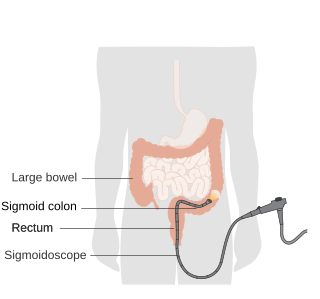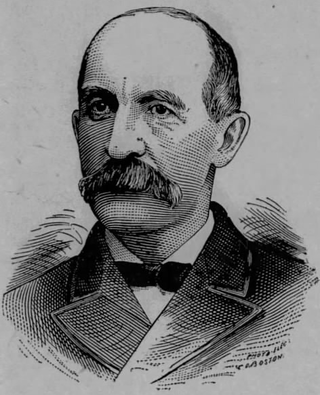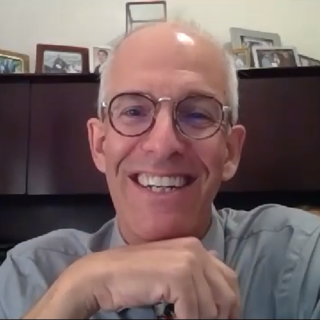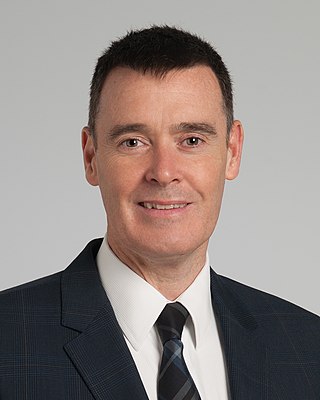
Fairfax is a town in Franklin County, Vermont, United States, with a population of 5,014 at the 2020 census.

Sigmoidoscopy is the minimally invasive medical examination of the large intestine from the rectum through to the nearest part of the colon, the sigmoid colon. There are two types of sigmoidoscopy: flexible sigmoidoscopy, which uses a flexible endoscope, and rigid sigmoidoscopy, which uses a rigid device. Flexible sigmoidoscopy is generally the preferred procedure. A sigmoidoscopy is similar to, but not the same as, a colonoscopy. A sigmoidoscopy only examines up to the sigmoid, the most distal part of the colon, while colonoscopy examines the whole large bowel.

Colorectal surgery is a field in medicine dealing with disorders of the rectum, anus, and colon. The field is also known as proctology, but this term is now used infrequently within medicine and is most often employed to identify practices relating to the anus and rectum in particular. The word proctology is derived from the Greek words πρωκτός proktos, meaning "anus" or "hindparts", and -λογία -logia, meaning "science" or "study".

Ileostomy is a stoma constructed by bringing the end or loop of small intestine out onto the surface of the skin, or the surgical procedure which creates this opening. Intestinal waste passes out of the ileostomy and is collected in an external ostomy system which is placed next to the opening. Ileostomies are usually sited above the groin on the right hand side of the abdomen.

Henry Addison Fletcher was an American Civil War veteran, a farmer and a U.S. politician of the Republican Party. He is most notable for his service as the 38th lieutenant governor of Vermont from 1890 to 1892.

Russell Smith Taft was a lawyer, politician and judge who served as the 29th lieutenant governor of Vermont and chief justice of the Vermont Supreme Court.

William J. Van Patten was a Vermont businessman, philanthropist, and politician who served as President of the Vermont State Senate.

A. K. M. Fazlul Haque is a Bangladeshi surgeon. He was the founder of the Department of Colorectal Surgery in Bangabandhu Sheikh Mujib Medical University (BSMMU) in Dhaka.

Rufus Everson Brown was a Vermont attorney, farmer and politician. He served as Vermont Attorney General from 1912 to 1915.
The American Society of Colon and Rectal Surgeons (ASCRS), formerly the American Proctologic Society, is a professional society for surgeons specializing in colorectal surgery. It is one of the oldest surgical societies, having been established in 1899.
Dr. Roberto Bergamaschi is a colorectal surgery specialist, Chief of Colorectal Surgery Department at Westchester Medical Center, previously Professor of Division of Colorectal Surgery at State University of New York in Stony Brook, NY

Steven D. Wexner is an American surgeon and physician. He is Director of the Ellen Leifer Shulman and Steven Shulman Digestive Disease Center at Cleveland Clinic Florida. Wexner has received numerous regional, national, and international research awards. Through his multiple academic appointments, Wexner personally trains 15-20 surgeons each year, and he educates thousands more around the world through conferences and lectures. He is a resource for his colleagues from around the world for referral of patients with challenging or complex problems. In 2020, he was elected vice-chair of the Board of Regents of the American College of Surgeons for a one-year term. Since 1990. he has served as Symposium Director of the Cleveland Clinic Annual International Colorectal Disease Symposium. The Symposium was held in Fort Lauderdale or Boca Raton every year from 1990 to 2019. Since 2020, the Symposium has expanded to include host locations outside of the US with interruptions during the pandemic years of 2021–2022.

Conor P. Delaney MD, MCh, PhD, FRCSI, FACS, FASCRS, FRCSI (Hon.) is an Irish-American colorectal surgeon, CEO and President of the Cleveland Clinic Florida, the Robert and Suzanne Tomsich Distinguished Chair in Healthcare Innovation, and Professor of Surgery at the Cleveland Clinic Lerner College of Medicine. He is also the current President of the American Society of Colon and Rectal Surgeons (ASCRS). He was previously Chairman of the Digestive Disease & Surgery Institute at the Cleveland Clinic. He is both a Fellow and Honorary Fellow of the Royal College of Surgeons in Ireland and a Fellow of both the American College of Surgeons and American Society of Colon and Rectal Surgeons.

Lakeview Cemetery is a historic rural cemetery located off of North Avenue in Burlington, Chittenden County, Vermont. The cemetery was created in 1867 and dedicated in 1871, and overlooks Lake Champlain. It is near the current campus of Burlington High School.

Sir Neil James McCready Mortensen is Emeritus Professor of Colorectal Surgery at the University of Oxford Medical School and has been on the staff of the Oxford University Hospitals since 1987, where he is currently honorary consultant colorectal surgeon. He is a Fellow of Green Templeton College in the University of Oxford. Following his appointment in Oxford he campaigned for the recognition of colorectal surgery as a specialty and created the present department. He has clinical and research interests in a wide range of colorectal diseases.

John Percy Lockhart-Mummery FRCS, was a British surgeon at St Mark's Hospital, London, who devised a classification of rectal cancer and described familial polyposis which led to the formation of the polyposis registry. He was the author of several books, including Diseases of the Rectum and Colon and their Surgical Treatment (1923), The Origin of Cancer (1934), and After Us, or the World as it Might Be (1936). His work on colorectal surgery earned him the nickname "King Rectum".
Ralph John Nicholls, FRCS (Eng), EBSQ is a retired British colorectal surgeon, Emeritus Consultant Surgeon at St Mark's Hospital London and Professor of Colorectal Surgery, Imperial College London.














